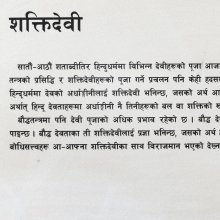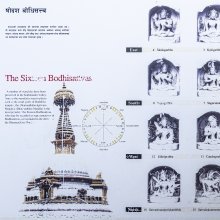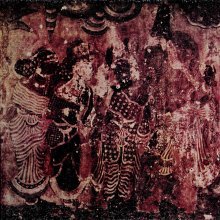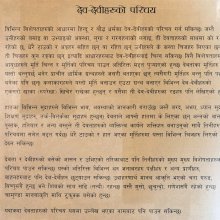Shatha, Śaṭha, Satha, Saṭha, Śaṭhā: 26 definitions
Introduction:
Shatha means something in Hinduism, Sanskrit, Buddhism, Pali, Marathi, Hindi, biology. If you want to know the exact meaning, history, etymology or English translation of this term then check out the descriptions on this page. Add your comment or reference to a book if you want to contribute to this summary article.
Shatha has 26 English definitions available.
The Sanskrit terms Śaṭha and Śaṭhā can be transliterated into English as Satha or Shatha, using the IAST transliteration scheme (?).
Images (photo gallery)
Languages of India and abroad
Sanskrit dictionary
[Deutsch Wörterbuch]
Source: Cologne Digital Sanskrit Dictionaries: Böhtlingk and Roth Grosses Petersburger WörterbuchŚaṭha (शठ):—
1) adj. (f. ā) a) falsch, hinterlistig, heimtückisch, boshaft [Amarakoṣa 3, 1, 46. 4, 26, 198.] [Trikāṇḍaśeṣa 3, 3, 109.] [Hemacandra’s Abhidhānacintāmaṇi 376.] [Anekārthasaṃgraha 2, 109.] [Medinīkoṣa ṭh. 8.] priyaṃ vakti puro nyatra vipriyaṃ kurute bhṛśam . vyaktāparādhaceṣṭaśca śaṭho yaṃ kathito budhaiḥ .. [Viṣṇupurāṇa im Śabdakalpadruma] śaṭhe yamekatra baddhabhāvo yaḥ . darśitabahiranurāgo vipriyamanyatra gūḍhamācarati .. [Sāhityadarpana 74. 70.] [PRATĀPAR. 5], a, 5. von Personen [Manu’s Gesetzbuch 4, 30.] [Bhagavadgītā 18, 28.] [Harivaṃśa 11314.] [Rāmāyaṇa 1, 6, 10 (8 Gorresio).] [Rāmāyaṇa Gorresio 2, 6, 24. 4, 16, 16. 36. 34, 34. 35, 3. 55, 10.] [Spr. (II) 230. 498. 616.] mitra [691. 2891. 4118. 786. 1780. 2569. 3165. (I) 1990,] [v. l. 2653. 2934. 4943.5003.] [KĀM. NĪTIS. 17, 29. fg.] [Mṛcchakaṭikā 64, 15. 137, 25.] rāṣṭriya [175, 5.] [Raghuvaṃśa 8, 48.] [Mālavikāgnimitra 55] (śatha gedr.). [Varāhamihira’s Bṛhajjātaka S. 15, 23. 16, 15. 69, 20.] [Kathāsaritsāgara 4, 65. 13, 127. 141. 15, 33. 18, 134. 167. 20, 66. 23, 35. 29, 197. 38, 64. 39, 71. 125. 40, 59. 42, 90. 46, 8. 54, 202. 61, 156. 66, 22.] [Rājataraṅgiṇī 4, 643.] [Bhāgavatapurāṇa 5, 6, 2. 8, 13. 8, 15, 22.] [ŚUK.] in [Lassen’s Anthologie (III) 38, 2.] vidhi [Spr. (II) 2406.] buddhi [2306.] [Rāmāyaṇa 5, 90, 11.] dhī [Mṛcchakaṭikā 84, 3.] mṛdupūrvaṃ śaṭhodarkaṃ karṇamābhāṣya [Mahābhārata 5, 3248.] ati von Personen [13, 2093.] [Spr. (II) 4258.] a desgl. [Manu’s Gesetzbuch 3, 246.] [Suśruta 2, 243, 15.] [Spr. (II) 1485.] dhī [Bhāgavatapurāṇa 8, 22, 23.] brāhmaṇajīvikā [Manu’s Gesetzbuch 4, 11.] vṛtti [Yājñavalkya’s Gesetzbuch 1, 123.] vṛtta [Mahābhārata 14, 1289.] — b) unparteiisch, neutral; m. Vermittler [Trikāṇḍaśeṣa] [Hemacandra’s Anekārthasaṃgraha] [Medinīkoṣa] —
2) m. a) Stechapfel (vgl. dhūrta) [Hemacandra’s Anekārthasaṃgraha] [Medinīkoṣa] — b) Nomen proprium gaṇa kuñjādi zu [Pāṇini’s acht Bücher 4, 1, 98.] eines Asura [Mahābhārata 1, 2537.] [Harivaṃśa 202.] eines Sohnes des Vasudeva [Harivaṃśa 1951] (gada die neuere Ausg.) [8095] (sutena st. śaṭhena die neuere Ausg.). [14439] (śaṭa die ältere, śata die neuere Ausg.). —
3) f. ī s. śaṭī . —
4) n. a) Saffran. — b) Tabernaemontana coronaria R. Br. (s. tagara). — c) Eisen [Rājanirghaṇṭa im Śabdakalpadruma] — Vgl. danta, ni, mahā, śāṭhāyana und śāṭhya .
--- OR ---
Śāṭha (शाठ):—s. kaṭha .
Sanskrit, also spelled संस्कृतम् (saṃskṛtam), is an ancient language of India commonly seen as the grandmother of the Indo-European language family (even English!). Closely allied with Prakrit and Pali, Sanskrit is more exhaustive in both grammar and terms and has the most extensive collection of literature in the world, greatly surpassing its sister-languages Greek and Latin.
See also (Relevant definitions)
Starts with (+18): Satakam, Sathata, Shatam, Shatamakan, Shatankam, Shathaavari, Shathab, Shathabuddhi, Shathabuddhita, Shathadhi, Shathaga, Shathagamika, Shathagopa, Shathai, Shathaka, Shathakopa, Shathakopa acarya, Shathakopadasa, Shathakopasahasranaman, Shathakopavishaya.
Ends with: Akshatha, Asatha, Astamitashatha, Dantasatha, Devadattashatha, Dushshatha, Kathashatha, Kramashatha, Mahashatha, Nishatha, Parisatha, Prashatha, Sushatha, Tveshatha, Uposatha, Vakshatha, Vishatha.
Full-text (+162): Asatha, Sathata, Santha, Dantasatha, Shathayanya, Shadha, Parisatha, Nishatha, Kathashatha, Kathashathin, Phanasapoli, Shathya, Shathodarka, Potaca, Kramashatha, Shatah, Ajivani, Shathaga, Shathaprakriti, Shathin.
Relevant text
Search found 36 books and stories containing Shatha, Śaṭha, Satha, Saṭha, Śaṭhā, Sāṭha, Sāṭhā, Sātha, Śāṭhā, Śāṭha; (plurals include: Shathas, Śaṭhas, Sathas, Saṭhas, Śaṭhās, Sāṭhas, Sāṭhās, Sāthas, Śāṭhās, Śāṭhas). You can also click to the full overview containing English textual excerpts. Below are direct links for the most relevant articles:
Bhajana-Rahasya (by Srila Bhaktivinoda Thakura Mahasaya)
Text 1 < [Chapter 8 - Aṣṭama-yāma-sādhana (Rātri-līlā–prema-bhajana sambhoga)]
Chaitanya Bhagavata (by Bhumipati Dāsa)
Verse 3.1.73 < [Chapter 1 - Meeting Again at the House of Śrī Advaita Ācārya]
Verse 2.23.28 < [Chapter 23 - Wandering about Navadvīpa On the Day the Lord Delivered the Kazi]
Verse 1.10.7 < [Chapter 10 - Marriage with Śrī Lakṣmīpriyā]
Tattvartha Sutra (with commentary) (by Vijay K. Jain)
Verse 5.35 - Atoms of the the same class (sadṛśa) < [Chapter 5 - The Non-living Substances]
Verse 2.41 - Beginningless association with the soul < [Chapter 2 - Category of the Living]
Verse 9.17 - Simultaneous afflictions in a single soul < [Chapter 9 - Stoppage and Shedding of Karmas]
Yogadrstisamuccaya of Haribhadra Suri (Study) (by Riddhi J. Shah)
Chapter 2.3 - Date of Haribhadrasūri < [Chapter 2 - Life, Date and Works of Ācārya Haribhadrasūri]
Chapter 5.3 - A Rejoicer of worldly existence (Bhavābhinandī Jīva) < [Chapter 5 - A Line of Demarcation between the first four and last four Yogadṛṣṭis]
Manusmriti with the Commentary of Medhatithi (by Ganganatha Jha)
Verse 7.123 < [Section X - Internal Administration]
Verse 4.196 < [Section XIV - Other Duties]
Satirical works of Kshemendra (study) (by Arpana Devi)
1.7. Virodhābhāsa (contradiction) < [Chapter 4 - Literary study of the Three Satirical Works]





